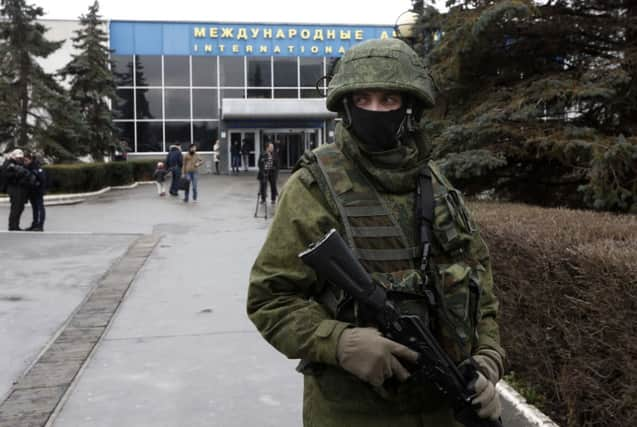Leaders: Looking for way out amid Putin’s sabre-rattling


They have no insignia to say who they are and refuse to talk, but, as they look and behave as disciplined troops, it is a fair assumption that they are Russian.
Why are they there? Russia has its Black Sea fleet’s major naval base at the Crimean port of Sevastopol, and two air bases at the airports where the silent soldiers have appeared. A bit more than half of the Crimean population count themselves Russian, either by origin or by allegiance, and some reports suggest Russian envoys have been handing out Russian passports to those who want them.
Advertisement
Hide AdAdvertisement
Hide AdThis points ominously in one direction only – that Russian president Vladimir Putin, who has been revving up his tanks on Ukraine’s borders, has in fact moved his troops over the border. The Russian constitution stipulates that its armed forces can operate outside Russia in defence of Russian citizens, so seizing control of airfields could be in preparation to invade Crimea or to get “Russians” out.
As if this was not bad enough, deposed Ukrainian president Viktor Yanukovich has popped up inside Russia, declaring he wants to “fight for Ukraine” against what he terms as lawlessness and terror. He described his usurpers as “neo-fascists”.
All the alibis and excuses for Russian intervention, possibly even for the restoration of Mr Yanukovich’s discredited regime, are clearly being prepared. Surely Mr Putin must know that in this bitterly divided country, and when Mr Yanukovich is under investigation by western banking authorities for plundering his country for personal gain, that such an incursion could lead to a bloody conflagration and a darkness comparable to that of the Cold War descending on East-West relations.
The new Ukrainian authorities, though they can hardly claim to have much authority over a large part of the country, have sensibly not risen to the bait. While they clearly have loyal armed forces, an escalation of belligerence may well be the catalytic excuse Mr Putin is looking for.
Diplomacy can still provide a way out. Ukraine’s most pressing problem is that it is broke. The IMF can provide loans, and so can Mr Putin. The most optimistic sign is that the telephone lines between western capitals and the Kremlin have been busy all day and various western leaders have said, perhaps not in these words, that they are willing to pay for a peaceful settlement.
The key question is what Mr Putin wants – complete tutelage over Ukraine or just considerable influence, neither of which is likely to be acceptable to Kiev’s protesting crowds. Convincing Mr Putin to keep his tanks away has to be the West’s prime objective, but winning a permanent peace is still a way off.
Terror amnesty cannot be one-sided
Unionist leaders in Northern Ireland, it is almost certain, knew nothing of the British government’s policy of essentially absolving republicans suspected of terrorist murders but who had evaded detention – the so-called “on-the-runs” – from the possibility of being prosecuted.
It smacks of a deliberate deception and makes them, most hurtfully in the eyes of their own supporters, look to be fools. They thought they were in charge of the province’s justice system, but they weren’t. It had been rigged to ensure that those, at least on the republican side, believed to be responsible for heinous crimes which still leave raw and bitter memories, would never be prosecuted.
Advertisement
Hide AdAdvertisement
Hide AdThe British government’s view is that, in order to bring peace and prevent any more such atrocities, some prices have to be paid. The judge in the case of John Downey, the Hyde Park bombing suspect, took the view that governments cannot go back on their word.
But even if David Cameron’s government does now make it clear to those who received the letters that they can still be prosecuted if evidence exists or is uncovered, and the letters only said they were not at the time wanted men, there are bound to be legal arguments.
As things stand, there are British soldiers who still face prosecution for death and injuries grievously offensive to republicans and no such prospect of amnesty seems to have been extended to unionist terror suspects.
If there are safeguards against prosecution and the arms of the law do have to be shortened to end a civil conflict, they should at least be reduced in length on both sides.